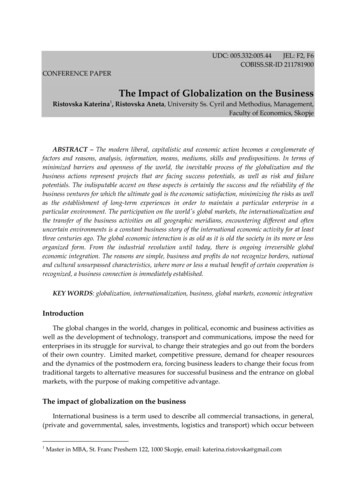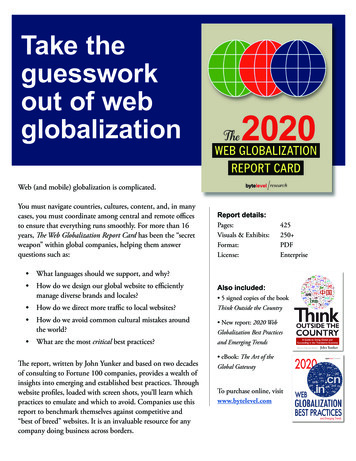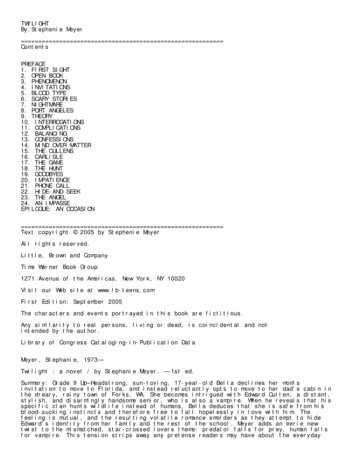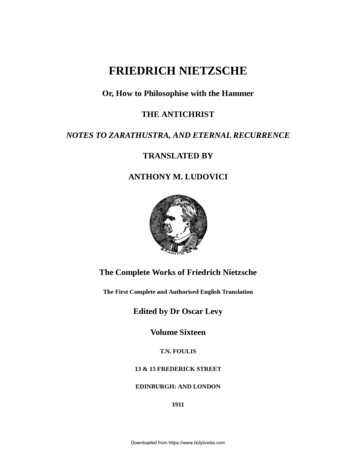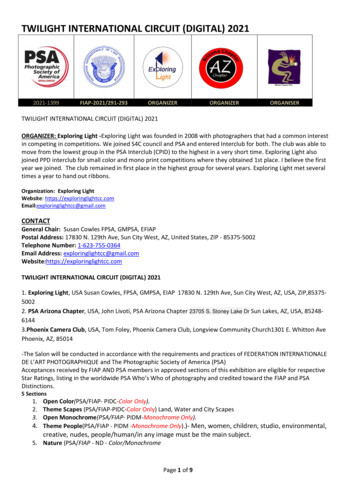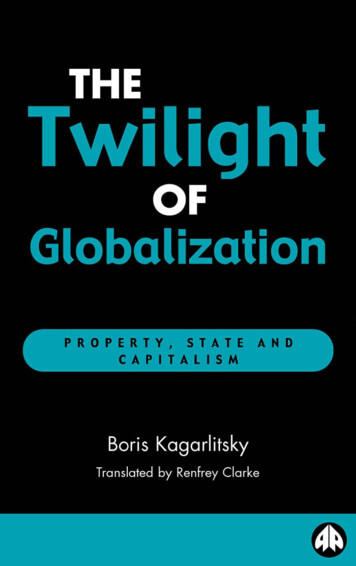
Transcription
The Twilight ofGlobalizationProperty, State and CapitalismBoris KagarlitskyTranslated by Renfrey ClarkePlutoPPressLONDON STERLING, VIRGINIA
First published 2000 by Pluto Press345 Archway Road, London N6 5AAand 22883 Quicksilver Drive,Sterling, VA 21066–2012, USACopyright Boris Kagarlitsky 2000This translation Renfrey Clarke 2000The right of Boris Kagarlitsky to be identified as the author of this work hasbeen asserted by him in accordance with the Copyright, Designs andPatents Act 1988.British Library Cataloguing in Publication DataA catalogue record for this book is available from the British LibraryISBN 0 7453 1586 0 hbkLibrary of Congress Cataloging in Publication DataKagarlitsky, Boris, 1958–The twilight of globalisation : property, state and capitalism / BorisKagarlitsky.p. cm.—(Recasting Marxism)Includes bibliographical references and index.ISBN 0–7453–1586–01. Economic development. 2. Capitalism. 3. Economic policy.I. Title. II. Series.HD75.K33 2000338.9—dc2199–046657Disclaimer:Some images in the original version of this book are notavailable for inclusion in the eBook.Designed and produced for Pluto Press byChase Production Services, Chadlington, OX7 3LNTypeset from disk by Stanford DTP Services, NorthamptonPrinted in the European Union
ContentsPrefaceviIntroduction: The New Big Brother11 The State and Globalization72 Is Nationalization Dead?403 Nations and Nationalism744 The Third World Labyrinth: Is a Democratic ModelPossible?113Conclusion127Notes129Index141
PrefaceThis is the second volume of ‘Recasting Marxism’. In the firstvolume I had to deal with the actually existing left and with thetheoretical debates which, according to my point of view, willshape its future. The crisis of the left is produced not by a lack of‘realism’ or ‘ideological obsession’ but by a lack of ideologicalvision. To overcome the crisis we must de-revise Marxism andrevitalize its theoretical tradition basing our politics on classinterests. However these interests themselves have to beredefined on the basis of the new social contradictions.In the second volume I deal with left-wing strategies towardsthe state and nation. I am convinced that the popular argumentabout the ‘impotence of the state’ in globalized capitalism is notonly wrong but deeply dishonest. It hides the use of the stateinstitutions by the organizations of financial capital and multinational corporations. It is precisely the strength of thesecapitalist institutions that forces us to put even greater emphasison strengthening the nation-state as a countervailing force andthe basis of any democratic participation.The argument about the ‘powerless state’ is also a form ofblackmail. If a state does anything wrong, it is going to bepunished. States can’t break the rules unilaterally because theywill be subjected to all sorts of pressures, including trade boycott,lack of investment and technology transfer, destabilization andeven military intervention. States can’t change the rules togetherbecause one has to make the first step, and that meansimmediate punishment.For the great majority of the world population, however, nopunishment could be worse than the continuation of the currentsituation. Naturally, if a state takes decisive steps, it must face therisks involved. But without that, any politics is impossible.In reality the masses in the periphery as well as in the corecountries are less afraid of the punishments meted out by globalcapital than the middle classes, who fear the prospect ofsacrificing some of their consumption. All contemporary leftistvi
Prefaceviimovements, however, in one way or another, are subordinatingthe masses to middle-class leaderships.The new leftist movements are in the making now. It is tooearly to predict the shape of the things to come. However, in thethird volume of this trilogy I will try to discuss the perspectivesand the contradictions of the left which are emerging out of thiscrisis.Answering some of the questions facing the left is the purposeof the trilogy. But most important questions must be dealt withand answered by the leftist movements themselves. The trilogyis written not just for academics but above all for the activists ofthe left. If it helps them to deal with their problems, if it is goingto be useful in their struggles, then my mission is accomplished.
Introduction:The New Big BrotherIn 1948 when George Orwell wrote Nineteen Eighty-Four it wasquite clear where Big Brother was to be found. While at that timebig government was seen by many as the solution to theproblems of postwar Europe, Orwell described the other side ofthe coin. Big Brother was not just another name for the Sovietsystem; Big Brother represented the omnipotent andomnipresent state that left no room for personal choices andindividual freedoms. Big Brother was to care for, protect and lead‘the little men’, or at least promised to do so; but also left themfrustrated and powerless before a faceless bureaucracy.Since then the situation has changed. With the triumph ofneo-liberalism the state was dramatically weakened. Bureaucracywas either downsized or stripped of many powers. But ‘the littleman’ does not feel any more free or secure, and the feeling offrustration and fear remains.While the state was getting weaker, multinational companiesand international financial institutions grew stronger. Thebudgets of some companies are bigger than those of many states.Large companies now lead development and sometimes pose ascaring, but they are totally unaccountable. While the state nolonger tries to control big business, multinational capital exercisesenormous control over the lives of people and the state itself.Public planning is replaced by private planning. Global institutions established after the war to regulate internationaleconomy, have changed their nature. The International MonetaryFund (IMF), the World Bank, the General Agreement on Tariffsand Trade (later transformed into the World Trade Organization– WTO) were established to provide some degree of public controlover the international market. Neo-liberalism turned them intoinstruments of deregulation. But not only that. They formulatetheir own agenda and impose it on peoples and states.‘National governments have ceded much of their power to a“New Institutional Trinity” – the IMF, World Bank andGATT/WTO’, write American scholars Jeremy Brecher and TimCastello. ‘These agencies increasingly set the rules within which1
2The Twilight of Globalizationindividual nations must operate, and they increasingly cooperatein pursuit of the same objectives – objectives generally indistinguishable from the Corporate Agenda.’1These institutions operate the same way as the Soviet Politburounder Brezhnev. IMF and World Bank experts decide what to dowith the coal industry in Russia, how to reorganize thecompanies in South Korea or how to mange the finances ofMexico. The greater the scale of the problems, the moresimplistic and primitive are the proposed answers. Like the Sovietbureaucrats before them, the IMF officials have a single set ofremedies for any ailment, to be applied everywhere from tropicalAfrica to the Russian tundra. They are also hostages of their ownideology (always the only correct and universal one) and of theinertia of their gigantic bureaucratic structures. Everywhere inthe world they have to overcome the ‘resistance of the material’.Setting aside the rhetoric of the ‘free market’, in practice theworld has never before experienced such centralization. EvenWestern governments have to reckon with this parallel authority.Brecher and Castello correctly point to the fact that this modelis basically undemocratic.Like the absolutist states of the past, this new system of globalgovernance is not based on the consent of the governed. It hasno institutional mechanism to hold it accountable to those itsdecisions affect. No doubt for this reason, it also fails toperform those functions of modern governments that benefitordinary people. It should come as no surprise that, like themonarchies of the past, this emerging system of undemocraticpower is calling forth revolts.2The old Big Brother is dead, meet the New Big Brother. Now BigBrother is global or multinational, but even more faceless andeven less accountable than before. It is no surprise that afterexperiencing what globalization has in store, so many peopleworld-wide are becoming nostalgic for the old Big Brother.The concentration of wealth and resources is unprecedented.No dictator of the past had as much power as the people whorun the IMF or huge companies like Microsoft or IBM. But thishyper-centralized system inevitably creates spectacular problems.The point is not that the neo-liberal model of capitalism doomsmost of humanity to poverty, nor that the countries of the
Introduction: The New Big Brother3periphery degenerate into barbarism. Such ‘moral’ questions donot bother ‘serious people’. In this system, the trouble is that theprice of mistakes is becoming unbelievably high. The hugeresources at the disposal of the IMF make it possible to ‘stabilize’the situation after every collapse. They can go on too long withpolicies based on decisions that have proved to be wrong.Socialist critics of the free market have always insisted that thissystem generated a tremendous amount of waste. Neo-liberalcritics of central planning pointed to the fact that overcentralized systems were also tremendously wasteful. Botharguments were basically right and were proved empirically.Global capitalism as it has emerged in the late 1990s is a systemthat is wasteful because it is both market-dominated and overcentralized.The world crisis that started in Asia in 1997 has revealed howgreat was this waste. ‘True, capital’s relentless drive to restructure– downsizing and “leaning” of production, outsourcing, casualization of much work, the creation of new capital markets,establishment of new trade and investment pacts – has reshapedthe terrain of struggle and resistance’, writes David McNally inMonthly Review, ‘But rather than altering capital’s essentialdynamics and contradictions, the crisis in Asia reveals just howexplosive those contradictions could be.’3 It became clear thatthe model of globalized capitalism was plagued by overaccumulation and overcapacity. This ‘excessive’ production isaccompanied by workers being badly paid, people starving in thepoor countries and the decline of social standards in the ‘rich’ones. Not only are human and material resources wasted, butfinancial resources as well. US Federal Reserve chairperson AlanGreenspan told a Congressional hearing in October 1998: ‘Thereare trillions and trillions of dollars out in all sorts ofcommitments around the world, and I would suspect there arepotential disasters running into a very large number, in thehundreds.’4 Billions of dollars were spent to bail out just onehedge fund, the Long Term Capital Management. This privatecompany managed to accumulate debts comparable to those ofwhole countries like Russia or Mexico. And that was just the tipof the iceberg.Globalization came along with the spread of new technologies, with the ‘information age’. Like Soviet bureaucrats in theearly 1970s who thought that new technologies would make
4The Twilight of Globalizationcentralized planning efficient overnight, multinationalcompanies and global financial institutions also insisted on technological change as a panacea for all ills. They did not learn theSoviet lesson that the problems of the system become even moreexplosive with the arrival of the new technology. Theorists of theinformation age speak about decentralization, ‘networkenterprise’ and ‘the network society’. Manuel Castells insists that‘multinational enterprises are not only engaged in networking,but are increasingly organized themselves in decentralizednetworks’.5 This transformation is real but very limited and it caneven strengthen the contradictions within the system. Manyeconomists describe this emerging new paradigm as ‘concentration of control combined with decentralization of production’.6The ‘network society’ is a utopia, at least within capitalism.Networks are growing and developing but they do not dominatethe social structure. On the contrary, the dominant structuresand interests try to use networks for their own purposes. Thatcreates new contradictions very similar to those which the Sovietsystem faced in the mid-1960s, when it first tried to decentralizedecision-making while at the same time retaining the ‘leadingrole’ of the Party.Networks do not presuppose a lack of hierarchy or authority(otherwise the networks themselves would fall apart) – they needa different kind of authority. And they generate new interests.Capitalism gave rise to many networks, but the logic ofnetworking is different from that of capital accumulation.Global capital itself is not organized through networks. It usesnetworks, but at the same time it is centralized and institutionalized. Manuel Castells tries to convince us that there arecapitalists presiding over all sorts of economies and people’s lives,but not a capitalist class.There is not, sociologically and economically, such a thing asa global capitalist class. But there is an integrated global capitalnetwork, whose movements and variable logic ultimatelydetermine economies and influence societies. Thus, above adiversity of human-flesh capitalists and capitalist groups thereis a faceless collective capitalist, made up of financial flowsoperated by electronic networks.7
Introduction: The New Big Brother5This description of a faceless capitalist network, doesn’t it looksurprisingly like the old Big Brother-type faceless bureaucracy?But, in the contemporary world, who makes the decisions? Andwhy are decisions so visibly influenced by particular interests andideas? Although the elite is faceless, it is not abstract or ‘virtual’.It is embodied in the real institutions and structures whereinterests are consolidated and decisions are made.This international business elite is represented politically bythe IMF and the World Bank, as well as by powerful oligarchs likeGeorge Soros or Bill Gates and top executives of the multinational companies. It is extremely integrated culturally andideologically.The strength of neo-liberal hegemony and the relativeweakness of other bourgeois ideologies (including those of ‘socialpact’ and ‘national road’) is a result of this consolidation of theglobal capitalist class, unprecedented in the earlier stages ofcapitalism. However, precisely because of this consolidation atthe international level, this new global elite is marginal withrespect to almost every society within which it operates. This wasvery clear in Russia or Latin America during the 1990s, but to acertain extent we can see the same thing in Britain or in theUnited States. In England it was cosmopolitan globalism thatundermined the old English bourgeois tradition. In the UnitedStates in 1998 ‘Main Street’ Republicans opposed PresidentClinton when he asked Congress to give more money to IMF.Clinton finally won, but the opposition from the traditionalistand parochial right was far more visible than that of the left.This marginality of the global elite explains the increasingstress it faces day to day. A common national identity orcommon roots were essential for every ruling class in history inorder to dominate the lower classes. Once the elite is globalizedwhile societies remain local and national, the elite finds it evermore problematic to impose their agendas on nationalpopulations. Resistance to globalization grows in Mexico andFrance, Russia and South Korea. In this situation the statebecomes essential again for the neo-liberal elite, but only as atool of coercion.States have used coercion ever since they first appeared inhistory, but it was always justified and legitimized through‘national interests’. This is no longer possible. On the contrary,state coercion is now used as a method of suppressing national
6The Twilight of Globalizationinterests. The level of coercion is different as well as the level ofresistance, but the problem exists everywhere.Not surprisingly in such circumstances, the left which reallydares to resist neo-liberal agendas becomes patriotic. It has todefend national societies against the global elites and against thenational state, which is transformed into their tool.This creates not only new opportunities but also greatideological problems for the left. In Mexico or France there is atradition of democratic, republican and revolutionary patriotism.In Russia or Germany this tradition does not exist or it isextremely weak. Russian nationalism was never a revolutionaryforce, it was always used by reactionary forces against democraticand socialist currents. There is always a temptation to borrowinspiration not only from the past but also from the right. Thisis exactly the case of the leadership of the Communist Party ofRussian Federation, which has gradually transformed itself intoa nationalist conservative formation. But that does not mean thatthe left must reject patriotism as an ‘old-fashioned’ or ‘bourgeois’ideology. On the contrary, the socialist movement has toformulate new ‘patriotic’ agenda based on the ideas of citizenshipand human rights, and its own new vision of the democratic anddecentralized state.The crisis of 1998 was the moment of truth for globalizedcapitalism. It is also the starting point for the new socialistproject. We must continue to resist. But we must also think interms of institutional change. We must present ourselves as thedemocratic alternative to the totalitarian power of the globalcapitalist Big Brother.
1The State and GlobalizationFor Marxists, the question of the state has always been above alla question of power. Marx and Engels spoke of state institutionsas a system of organized and legalized class coercion. Lenin notonly saw in the question of power the main question of anyrevolution, but also reduced it to the seizure and subsequenttransformation of the ‘state machine’. By the 1970s, however, ithad become obvious that the state no longer enjoyed amonopoly on power. Michel Foucault shook the thinking of theFrench radical intelligentsia by showing that power is dispersed,and does not by any means reside where people are accustomedto look for it. Inevitably this has been reflected in the strategy ofthe left.Realizing that the state did not possess the totality of realpower in modern capitalism, leftists became disillusioned withthe possibilities which the state offered. But if the state does notdispose of all power, that does not mean that the question ofpower can be decided outside of and apart from the state. Toofew leftists have posed the question of using the state as abridgehead in the struggle for real power. Without this, anydiscussion of reforms loses its meaning.Democracy and the MarketAndrey Ballaev noted on the pages of Svobodnaya mysl’ that themain weakness of socialists has always been their underestimation of the need for links between socio-economic and politicalreforms. ‘To put it somewhat crudely, socialism perceives the“rules of the game” of modern democratic republics as asufficient and even indispensable precondition for its progress.’ 1In practice, everything is far more complex. The new problemsof society require a qualitative transformation of the state system.Because the capitalist market cannot get by without nonmarket institutions, the state as a non-commercial entity plays akey role, not only financing public bodies but also overseeing the7
8The Twilight of Globalizationinteraction between the development of the economy and thatof the various structures of the social sphere. Among Marxists inthe early twentieth century a bitter polemic raged between thosewho saw in the West the triumph of ‘pure’ democracy and thosewho viewed the state above all as an instrument of class coercion.In essence, however, both sides merely revealed the limitationsof ‘classical’ Marxism. It was no accident that Gramsci in hisPrison Notebooks devoted so much space to the concept of‘hegemony’ that later became so fashionable. Without a certainconsent by the governed, the state could hardly perform its classfunction. But this means that the state system, as an instrumentof the ruling class, cannot fail to take account of the interests ofother social layers as well. When the institutions of power proveincapable of this, the state system enters into crisis.The contradictory nature of the state’s role is reflected in thesimilarly contradictory policies of the left in relation to the state.But it is not only the left that has problems here. Liberalism, thatproclaims the principle of the ‘small state’, needs police coercionin order to put its ideas into practice. It seems strange at firstglance that liberalism, as an ideology of the bourgeoisie, shouldattack the bourgeois state. But this contradiction is illusory;liberalism is aimed against the non-bourgeois elements in thebourgeois state. Liberalism continually calls for a reduction tothe minimum of the role of those institutions that are not linkeddirectly to the defence of the capitalist order. In so doing, itconstantly destabilizes this order.The institutions of the state ensure the historical continuitywithout which the legitimacy of power can seem very dubious.This is why Britain and the Scandinavian countries have retainedthe monarchy, even though their political systems have becomemodels for many republics. If kings and lords constitute a linkwith the pre-capitalist past, the welfare state provides a link withthe future. Neo-liberal reaction is aimed at breaking this link. Ifhistory comes to an end, the future will never happen. And toensure this, it is necessary to take the appropriate measures.The representatives of the social sphere – those working inpublic services, science, education, etc. – do not like the state,but their situation becomes still worse when state institutions areweakened. Intellectuals cannot stand bureaucrats, but theyconstantly appeal to them for help. Without the state the secularintelligentsia cannot exist. The clerical intelligentsia can, as is
The State and Globalization9proved by the history of feudalism. But the average modern intellectual is not prepared to enter a monastery.The social sphere, which plays an increasing role in the life ofhumanity, cannot develop outside the state, but at the same timethe structures of the state are quite unsuited to it. ‘For thepresent’, noted Ballaev, ‘this conflict is more reminiscent of acontest in which the social sphere is gradually gatheringstrength, despite suffering constant defeats.’ This conflict shiftsmore and more towards the regional and inter-state level, wherethe contradictions that were earlier evident on the national levelare reproduced in a new form. Sooner or later such developmentleads either to catastrophe or to ‘the transformation of theeconomic system and of the political nature of the state’.2The contradiction between the theoretical need for the renewalof the state and the practical bankruptcy of the state in itspresent-day form spills over into the impotence of the politicalstrategy of the left, the confused declarations of ideologues andthe bewilderment of activists. A theoretical argument which isfrequently invoked in order to justify inaction holds that thenational state, as a central element in the strategy of leftists(whether Marxists or social democrats), is now losing its significance. The weakening of the role of the national state in thecontext of the ‘global market’ is an incontestable fact. But it isequally indisputable that, despite this weakening, the stateremains a critically important factor in political and economicdevelopment. It is no accident that transnational corporationsconstantly make use of the national state as an instrument oftheir policies.It is clear that leftists need to have their own internationaleconomic strategy, and to act in a coordinated way on a regionalscale, but the instrument and starting point of this newcooperation can only be a national state. There is no need tosuppose that capital can reconcile itself to radical reforms in thesphere of property. In a country where unique resources arepresent (and many countries including Russia, Mexico and SouthAfrica have such resources), and where regional business interestsare concentrated, even large transnational corporations willprefer to make concessions to the state sector rather than to placeat risk the very possibility of their participating in this market.In general, it should be noted that among left ideologues ahealthy scepticism with regard to the possibilities of the state has
10The Twilight of Globalizationvery quickly been replaced by completely absurd theories in thespirit of ‘stateless socialism’. In the 1950s, when socialists posedthe question of nationalization, liberal ideologues stressed thatproperty itself was not as important as the mechanism of control.In the 1980s, however, massive privatization began, leading tothe destruction of the state sector on a world scale. Meanwhile,a significant sector of the left has not only failed to resist privatization, but has in practice become reconciled to its results.The Logic of GlobalizatonFor the most part, the ideologues of the left have becomereconciled to an image of the state as a demoralized bureaucraticmachine that is quite unable to carry out effective management,and which merely swallows the money of taxpayers. It has to berecognized that such images do not appear out of thin air. Butin most countries it was not the left that created the statebureaucracy, even if the left figures in the consciousness ofmillions of people as its servant and defender. At the same timethe right effectively exploits for its interests both the annoyanceof citizens with the state, and their no less powerful demand thatthe state defend them against foreign threats. Such threats moreand more often turn out to consist not of hordes of foreignwarriors, but of mountains of foreign goods, crowds of halfstarved emigrants and a mafia that is rapidly internationalizingitself – in short, the natural consequences of the economicpolicies pursued by the right itself.The problem of the state becomes insoluble for leftists fromthe moment they reject the idea of the radical transformation ofthe structures of power. The established state structures start toappear unshakeable. They can either be accepted or rejected. Onthe symbolic level, leftists do both. Practical politics, whichunavoidably gives rise to constant changes in state structures andinstitutions, becomes a monopoly of the right.The democratization of power and the participation of themasses in decision-making cannot in themselves guarantee thatsocial reforms will be successful. But if leftists, on coming topower, do not begin promptly to democratize the institutions ofthe state, this can only end in the degeneration and ignominiouscollapse of the left government.
The State and Globalization11Meanwhile, in the 1990s the very possibility of seriousstructural reforms on the level of the national state has beenplaced in doubt. Globalization has become a key idea of neoliberalism in the 1990s, against a background of the downfall ofall other ideologies. At the same time, the thesis of the‘impotence of the state’, that has become widespread amongleftists, has acquired three bases. Governments have beenregarded as powerless in relation to transnational corporations(such as Microsoft, Ford or the Russian Gazprom); in relation tointernational financial institutions such as the World Bank andthe International Monetary Fund; and finally, in relation to interstate formations such as the North American Free TradeAgreement (NAFTA), which links the US, Canada and Mexico, orthe bodies created on the basis of the Maastricht Treaty inEurope.Globalization, however, is nothing qualitatively new in thehistory of bourgeois society. Capitalism was born and grew tomaturity as a world system. It was only towards the end of theeighteenth century that national capitalism, rooted in the socialstructures of particular Western countries, began to develop. Thisnational capitalism, like modern nations themselves, was not aprecondition for but a product of the development of capitalismas a world system. At the end of the twentieth century, capitalismis again becoming directly global. This does not put an end tonational societies or states, although these, as in the epoch ofearly capitalism, are in profound crisis. As Wallerstein notes:Modern states are not the primordial frameworks within whichhistorical development has occurred. They may be moreusefully conceived as one set of social institutions within thecapitalist world-economy, this latter being the framework withwhich, and of which, we can analyze the structures, conjunctures, and events.3While some late-twentieth-century economists and sociologists emphasize the changes that are connected withglobalization, other writers stress that the processes underdiscussion are far from new. James Petras argues that:Economies, North and South, have alternated between theglobal and national/regional markets over the past 500 years.
12The Twilight of GlobalizationIn the twentieth century ‘globalization’ was intense until 1914,followed by a prolonged period of shift to nationaldevelopment during the late 1920s to the mid-1940s, followedby an increasing and uneven effort from the 1950s to the1970s to return to globalization. The overthrow of nationalistand socialist regimes and the increased competitiveness ofAsian capitalism in the 1980s has led to the current period of‘globalization’, a phase which is itself today under increasingattack from within most countries, North and South. Thusglobalization is not the ‘ultimate’ phase of capitalism butrather a product of state policies
The twilight of globalisation : property, state and capitalism / Boris Kagarlitsky. p. cm.—(Recasting Marxism) Includes bibliographical references and index. ISBN 0–7453–1586–0 1. Economic development. 2. Capitalism. 3. Economic policy. I. Title. II. Series. HD75.K33 2000 338.
